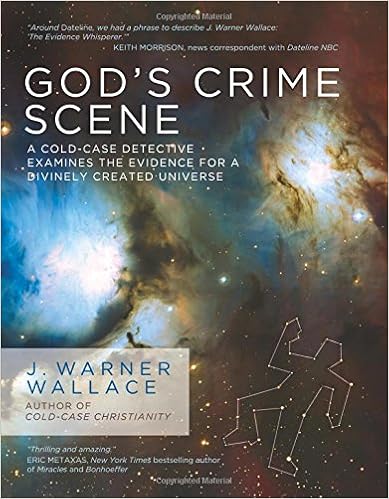Previously, I finished up an explanation of the argument for God based on our moral intuitions, and today I want to take a bit of a side-trip while on the subject of morality. As noted previously, we do find that objective morality exists, but sometimes it can be hard to discern what the moral thing to do is in a given situation. This does not constitute an argument against objective morality (the ontology of it), only our ability to know what the moral good in the situation is (epistemology).
we do find that objective morality exists, but sometimes it can be hard to discern what the moral thing to do is in a given situation. This does not constitute an argument against objective morality (the ontology of it), only our ability to know what the moral good in the situation is (epistemology).
We often characterize moral dilemmas as choosing between “the lesser of two evils.” and this certainly conveys the angst involved in having to choose among difficult options. I would submit that this proves ultimately to be an unhelpful phrasing of the problem which leads to unnecessary additional indecisiveness, guilt, and second-guessing. It also doesn’t seem to be quite accurate: if one imagines Christ himself in a position of “choosing between two evils,” doesn’t that still equate to Christ choosing evil? That must not be the right way for us to approach these dilemmas, so how should we then?
I believe a more helpful and accurate way to look a these moral dilemmas is, rather, by asking, “Which option will accomplish the greater good?” The answer to that question, as best as we can discern it, is the option we ought to take. Perhaps a couple of examples will clarify this point.
In Joshua 2, the Hebrews sent spies into Jericho to assess the strength of the people and the city. While there, they came under suspicion of the city guard and took refuge with a woman named Rahab. When the guard approached Rahab, she faced a moral dilemma: reveal the location of the spies, leading to their deaths, or lie to the guards. Rahab concealed the spies and mislead the guard, recognizing that the Hebrews served the true God. In this case, did Rahab sin?
A more contemporary example is that of Corrie Ten Boom’s family who sheltered Jews in their home during the rise of persecution of Jews in Nazi Germany. Her family had to make a choice: admit to the German soldiers that Jews were hidden there, or tell a lie to the soldiers. They chose to lie. Did God disapprove of their actions? Was it sin?
I believe in both of these cases, we are not stuck in a position in which there is sin, no matter which option is chosen. Instead, in moral dilemmas, such as these, we must assess the good available to be accomplished in the situation, as best as we are able, and choose the greater of these goods. Is honesty usually a virtue? Yes. Is saving a life a greater virtue? I would think so. In both of these examples, the greater good is accomplished by working to save the lives of the Jews, than by giving the truth to those who did not have legitimate right to it.
In these sorts of circumstances, we choose the greater good, and that good supersedes the other lesser good which we must violate, and I believe that God gives his blessing. No repentance for sin is needed. That’s not to say that these become easy choices, but it should make them easier to decide with clear conscience, even if sadness for difficult dilemmas still weigh on us. This should be quite freeing for you! We all face moral dilemmas, but facing them from the perspective of “what is the choice that can bring about the most good?” can be an easier question than “which of these alternatives are the least evil?” Is this just semantics? Well, sort of, but the difficulty of decision-making can be trying enough without unnecessary guilt adding the paralyzing further pressure of a no-win sin situation. It doesn’t have to be that way.
I hope this was helpful for you! If so, let me know! If you disagree, let’s talk about it. Comments, questions, challenges? Email me through the form on my “about” page, we’ll discuss, and your comments may inspire a follow-up post!

 We have to make sense of this somehow. Often this is presented as a problem for Christianity: something along the lines of, If God is good (as you say he is), how can there be so much evil and suffering in the world? If he was real, there wouldn’t be so much. So, he must not really exist. In essence, the argument says that the presence of evil means that the God Christians proclaim can’t exist because he is either unable (and therefore not all-powerful) or unwilling (and therefore not all-good), since he has not eradicated evil.
We have to make sense of this somehow. Often this is presented as a problem for Christianity: something along the lines of, If God is good (as you say he is), how can there be so much evil and suffering in the world? If he was real, there wouldn’t be so much. So, he must not really exist. In essence, the argument says that the presence of evil means that the God Christians proclaim can’t exist because he is either unable (and therefore not all-powerful) or unwilling (and therefore not all-good), since he has not eradicated evil.

 address some of the explanations proposed by materialistic and evolutionary theories, and how I think they fail as adequate alternatives.
address some of the explanations proposed by materialistic and evolutionary theories, and how I think they fail as adequate alternatives. which points to a Designer.
which points to a Designer.
 this: a design requires a designer, and as the universe gives good evidence of design, we are well-justified in believing in a grand Designer. Here’s the formal argument:
this: a design requires a designer, and as the universe gives good evidence of design, we are well-justified in believing in a grand Designer. Here’s the formal argument: briefly address a few.
briefly address a few.
